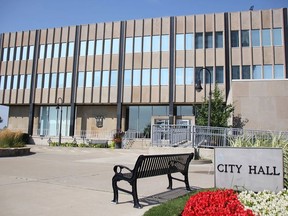
It was about six years ago Aamjiwnaang First Nation stopped covering the cost of band members’ unpaid water and sewer bills, as it was proving unsustainable, a new City of Sarnia report says.
Advertisement 2
Article content
Today, about 30 Aamjiwnaang properties have unpaid bills, adding up, with interest, to about $65,000, the report by engineering and operations general manager David Jackson says.
Article content
The city and First Nation, after numerous discussions over the years, have come up with a new agreement to deal with the issue, the report says.
Sarnia, along with Bluewater Power that takes care of billing, would waive the interest—about $15,400—Aamjiwnaang would “work with their residents … to somehow” pay the outstanding principal of about $49,000, and properties that don’t pay in the future would be subject to water shutoffs, Jackson said in an interview.
Sarnia city council considers the matter Dec. 11.
Various notices by mail, hand delivery, and phone would happen before any shutdown, Jackson said, noting people would also be provided with information about support services in the community.
Advertisement 3
Article content
“The goal is with the new policy, most people would be able to do something before it gets to that stage,” he said, adding “we never do want to disconnect water.”
The policy update matches existing shutoff clauses for other services, like electricity and gas, for Aamjiwnaang members, he said.
In Sarnia, unpaid bills get shifted to property taxes, in a move that limits confrontation “and ensures the water system is funded,” Jackson’s report says.
“Aamjiwnaang residents do not pay city property taxes and so this option is not available,” it says.
Why water wasn’t already subject to shutoffs on the First Nation, like other services, isn’t entirely clear, Jackson said.
Sarnia historically would also have shut off water for nonpayment, but switched to the property taxes method for unpaid bills when the Municipal Act began allowing it, Jackson said.
Advertisement 4
Article content
The clause allowing it—398 (2)—dates back to at least the early 2000s.
“I don’t know the history, other than the assumption is when we were allowed to switch to property taxes, (we) probably should have had more consideration to Aamjiwnaang,” Jackson said.
Aamjiwnaang First Nation Chief Chris Plain didn’t respond to an email requesting comment.
Many other municipalities still disconnect water for nonpayment, Jackson said.
The policy also includes a clause that water would not be shut off between Dec. 1 and April 15 for nonpayment. However, if it’s already been shut off and payment is still outstanding, it wouldn’t be turned back on again for that period, Jackson said.
About half the properties currently in arrears are tenants of Aamjiwnaang, and there are also plans to incorporate water and sewer costs into First Nation rent agreements, his report says.
“Therefore, the number of incidents of non-payment resulting in potential discontinuation of water service should be low,” it says.
An update to a longstanding water and wastewater service agreement between the two communities was inked in 2016 and renewed in 2021, it says.
Article content